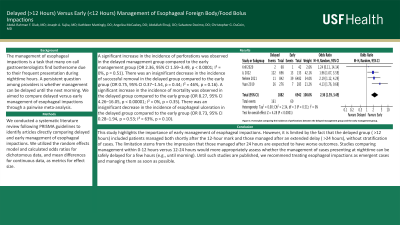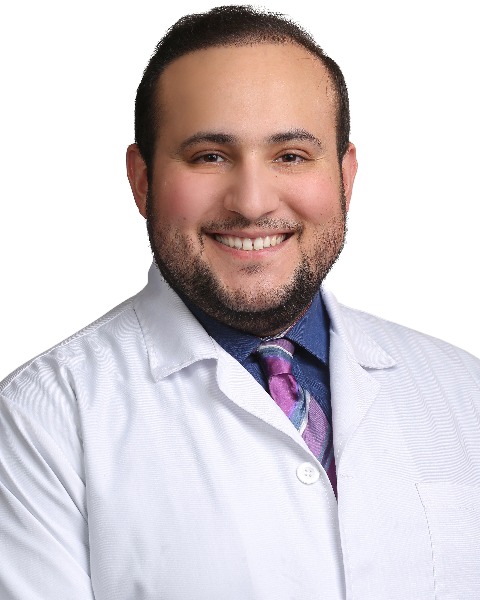Sunday Poster Session
Category: Esophagus
P0476 - Delayed (>12 Hours) Versus Early (<12 Hours) Management of Esophageal Foreign Body/Food Bolus Impactions
Sunday, October 27, 2024
3:30 PM - 7:00 PM ET
Location: Exhibit Hall E

Has Audio

Abdul-Rahman F. Diab, MD
University of South Florida Morsani College of Medicine and University of Central Florida, HCA Healthcare GME
Ocala, FL
Presenting Author(s)
Abdul-Rahman F. Diab, MD1, Joseph A. Sujka, MD2, Kathleen Mattingly, DO3, Angelica McCaskey, DO3, Abdullah Elnaji, DO3, Salvatore Docimo, DO2, Christopher G. DuCoin, MD2
1University of South Florida Morsani College of Medicine and University of Central Florida, HCA Healthcare GME, Ocala, FL; 2University of South Florida Morsani College of Medicine, Tampa, FL; 3University of Central Florida, HCA Healthcare GME, Ocala, FL
Introduction: The management of esophageal impactions is a task that many on-call gastroenterologists find bothersome due to their frequent presentation during nighttime hours. A persistent question among providers is whether management can be delayed until the next morning. We aimed to compare delayed versus early management of esophageal impactions through a pairwise meta-analysis.
Methods: We conducted a systematic literature review following PRISMA guidelines to identify articles directly comparing delayed and early management of esophageal impactions. We utilized the random effects model and calculated odds ratios for dichotomous data, and mean differences for continuous data, as metrics for effect size.
Results: A significant increase in the incidence of perforations was observed in the delayed management group compared to the early management group (OR 2.36, 95% CI 1.59–3.49, p < 0.0001; I² = 0%, p = 0.51). There was an insignificant decrease in the incidence of successful removal in the delayed group compared to the early group (OR 0.75, 95% CI 0.37–1.54, p = 0.44; I² = 46%, p = 0.16). A significant increase in the incidence of mortality was observed in the delayed group compared to the early group (OR 8.27, 95% CI 4.26–16.05, p < 0.00001; I² = 0%, p = 0.35). There was an insignificant decrease in the incidence of esophageal ulceration in the delayed group compared to the early group (OR 0.73, 95% CI 0.28–1.94, p = 0.53; I² = 63%, p = 0.10).
Discussion: This study highlights the importance of early management of esophageal impactions. However, it is limited by the fact that the delayed group ( >12 hours) included patients managed both shortly after the 12-hour mark and those managed after an extended delay ( >24 hours), without stratification of cases. The limitation stems from the impression that those managed after 24 hours are expected to have worse outcomes. Studies comparing management within 0-12 hours versus 12-24 hours would more appropriately assess whether the management of cases presenting at nighttime can be safely delayed for a few hours (e.g., until morning). Until such studies are published, we recommend treating esophageal impactions as emergent cases and managing them as soon as possible.

Disclosures:
Abdul-Rahman F. Diab, MD1, Joseph A. Sujka, MD2, Kathleen Mattingly, DO3, Angelica McCaskey, DO3, Abdullah Elnaji, DO3, Salvatore Docimo, DO2, Christopher G. DuCoin, MD2. P0476 - Delayed (>12 Hours) Versus Early (<12 Hours) Management of Esophageal Foreign Body/Food Bolus Impactions, ACG 2024 Annual Scientific Meeting Abstracts. Philadelphia, PA: American College of Gastroenterology.
1University of South Florida Morsani College of Medicine and University of Central Florida, HCA Healthcare GME, Ocala, FL; 2University of South Florida Morsani College of Medicine, Tampa, FL; 3University of Central Florida, HCA Healthcare GME, Ocala, FL
Introduction: The management of esophageal impactions is a task that many on-call gastroenterologists find bothersome due to their frequent presentation during nighttime hours. A persistent question among providers is whether management can be delayed until the next morning. We aimed to compare delayed versus early management of esophageal impactions through a pairwise meta-analysis.
Methods: We conducted a systematic literature review following PRISMA guidelines to identify articles directly comparing delayed and early management of esophageal impactions. We utilized the random effects model and calculated odds ratios for dichotomous data, and mean differences for continuous data, as metrics for effect size.
Results: A significant increase in the incidence of perforations was observed in the delayed management group compared to the early management group (OR 2.36, 95% CI 1.59–3.49, p < 0.0001; I² = 0%, p = 0.51). There was an insignificant decrease in the incidence of successful removal in the delayed group compared to the early group (OR 0.75, 95% CI 0.37–1.54, p = 0.44; I² = 46%, p = 0.16). A significant increase in the incidence of mortality was observed in the delayed group compared to the early group (OR 8.27, 95% CI 4.26–16.05, p < 0.00001; I² = 0%, p = 0.35). There was an insignificant decrease in the incidence of esophageal ulceration in the delayed group compared to the early group (OR 0.73, 95% CI 0.28–1.94, p = 0.53; I² = 63%, p = 0.10).
Discussion: This study highlights the importance of early management of esophageal impactions. However, it is limited by the fact that the delayed group ( >12 hours) included patients managed both shortly after the 12-hour mark and those managed after an extended delay ( >24 hours), without stratification of cases. The limitation stems from the impression that those managed after 24 hours are expected to have worse outcomes. Studies comparing management within 0-12 hours versus 12-24 hours would more appropriately assess whether the management of cases presenting at nighttime can be safely delayed for a few hours (e.g., until morning). Until such studies are published, we recommend treating esophageal impactions as emergent cases and managing them as soon as possible.

Figure: Forest plot comparing the incidence of perforations between the delayed management group and the early management group.
Disclosures:
Abdul-Rahman Diab indicated no relevant financial relationships.
Joseph Sujka indicated no relevant financial relationships.
Kathleen Mattingly indicated no relevant financial relationships.
Angelica McCaskey indicated no relevant financial relationships.
Abdullah Elnaji indicated no relevant financial relationships.
Salvatore Docimo indicated no relevant financial relationships.
Christopher DuCoin indicated no relevant financial relationships.
Abdul-Rahman F. Diab, MD1, Joseph A. Sujka, MD2, Kathleen Mattingly, DO3, Angelica McCaskey, DO3, Abdullah Elnaji, DO3, Salvatore Docimo, DO2, Christopher G. DuCoin, MD2. P0476 - Delayed (>12 Hours) Versus Early (<12 Hours) Management of Esophageal Foreign Body/Food Bolus Impactions, ACG 2024 Annual Scientific Meeting Abstracts. Philadelphia, PA: American College of Gastroenterology.
